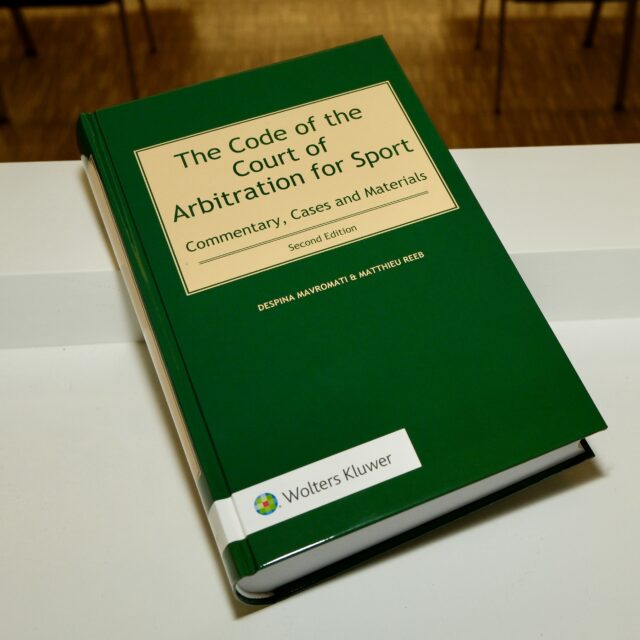The ECtHR offers important guidelines for establishing sports tribunals – Ali Riza et al. v. Turkey
On 28 January 2020, the European Court of Human Rights (“ECtHR”) published its decision in the application of Mr. Riza et al against Turkey (“ECtHR Judgment” or “Riza et al. Judgment”). It’s worth noting that the Judgment, similar to the Pechstein Judgment. The ECtHR found that Turkey violated Article 6 § 1 of the European Convention of Human Rights (“the Convention”) due to the structural deficiencies of the Arbitration Committee of the Turkish Football Federation and ordered that the TFF dispute resolution instances be reformed.
Even though the case relates to the football dispute resolution instances in Turkey, the recent judgment of the ECtHR is of systemic importance and will impact on the structure and governance of sports adjudicating instances on a wider geographical scale.
The Swiss Federal Tribunal (“SFT”) has repeatedly declared that the internal instances of sports federations are not “genuine arbitral tribunals” but merely the expression of the will of the association (see 4A_492/2016, Judgment of February 7, 2017, at 3.3.3). However, the ECtHR Judgment imposes higher requirements on the “independent” tribunals of sports federations, to the extent that recourse is compulsory and there is no subsequent judicial review by an independent court. This judgment, that relates to a purely contractual matter (Mr. Riza) and a regulatory issue (Mr. Akal), comes after the Mutu and Pechstein judgment that was rendered by the ECtHR in October 2018 and related to a contractual- and a doping-related matter, respectively.
This note discusses the particular facts, the key findings of the ECtHR Judgment; the similarities and differences when compared to the Mutu and Pechstein Judgment of the ECtHR; some fundamental principles that sports tribunals must take into account in case there is no possibility for a subsequent appeal venue against their decisions; and, finally, the limits within which these high standards apply.
1) Overview of facts and various proceedings prior to the ECtHR Judgment
All Applicants contested the independence of the TFF Arbitration Committee that had previously issued decisions against them: Mr Riza (a former professional football player of dual British and Turkish nationality) was found liable for breach of contract with his former club; Mr Akal, a football referee of Turkish nationality was downgraded from top-level assistant referee to “provincial referee”; and three other Turkish amateur football players were found guilty of match-fixing charges. The facts have also been summarized in a Press Release of the Court dated 28 January 2020. Only Mr. Riza appealed to the CAS and then to the SFT, with a pending application before the ECtHR against Switzerland and these proceedings are summarized below.
The TFF Arbitration Committee Decision, the CAS Award and the SFT Judgment
Mr. Riza and his former football club (“the Club”) entered into an employment dispute. The Club started proceedings against him for breach of contract before the Turkish Football Federation (“the TFF”) Arbitration Committee. The Committee found that Mr Riza had wrongfully terminated his contract and imposed a financial sanction.
Mr. Riza appealed against the decision to the CAS in Lausanne but the latter rejected the appeal for lack of jurisdiction. In this interesting CAS award – one of the first to discuss the “international dimension” of football cases – the CAS Panel held that Article 63.1 of the FIFA Statutes (2008 version), which requires national federations to confer jurisdiction to an independent and duly constituted arbitration tribunal, could not be regarded as an arbitration clause in favour of CAS for national disputes per se. By the same token, claims regarding the lack of independence of the national sports tribunals raised by Mr. Riza (as they were also – successfully – raised before the ECtHR) could not give rise to the jurisdiction of the CAS automatically (see CAS 2010/A/1996, para. 50).
According to the CAS Panel, the TFF Rules provided for an appeal to the CAS only under specific requirements, including the existence of an «international dimension». It found that this condition was not met by the sole fact that Mr. Riza was a dual (British and Turkish) national. This was confirmed by the SFT in the subsequent SFT judgment 4A_404/A2010 (see below, at 4.1.3 and 4.3.3.2).
The ensuing motion to set aside the CAS award was equally dismissed by the Swiss Federal Tribunal (“the SFT”). (see 4A_404/2010, judgment of April 19, 2011).
Ali Riza v. Switzerland
Following the dismissal of his appeal by the SFT, Mr. Riza lodged a complaint (no. 74989/11) against Switzerland before the ECtHR, which is still pending. The claims raised in this application related to alleged violations of Article 6 § 1 ECtHR with respect to the CAS and SFT proceedings and his access to courts because the CAS found that it lacked jurisdiction (see the ECtHR Judgment, para. 24). Mr. Riza also claimed violation of his right to a public hearing before the CAS and the SFT and various violations of his right to a fair hearing (equality of arms) before the SFT because the other parties were granted five times more time to file their answer than he had to file his motion.

2)The ECtHR Judgment – Some key Takeaways
Non-Applicability of Article 6 § 1 on the Amateur Football Players’ complaints
The Amateur Players’ case related to proceedings before the TFF against them with match-fixing charges. Both the first instance decision by the Amateur Football Disciplinary Committee of the TFF and the Arbitration Committee found that the Amateur Players had committed the disciplinary offence of “influencing the match result” and were banned from any football-related activities for a year.
However, Article 6 § 1 does not automatically apply to all cases. The charges imposed on the Amateur Football Players were, at the material time, considered as a “disciplinary offence” and not a criminal charge under that provision (see the ECtHR Judgment, para. 154).
Viewed from the angle of civil rights and obligations (an autonomous concept that is not interpreted according to recourse to any national law (i.e. Turkish law), see the ECtHR Judgment, para. 150) and even though disciplinary proceedings involving the right to practice a profession fall within the scope of “civil rights and obligations” under Article 6, amateur football was considered to be a non-remunerated activity. Moreover, the Amateur Players failed to adduce evidence regarding salaries (or any pecuniary losses under Article 1 of Protocol No. 1 and Article 13 ECHR).
As a result, the ECtHR rejected the Amateur Players’ complaints under Article 6 § 1 as inadmissible (see Article 35 § 3 and 35 § 4 of the Convention; see the ECtHR Judgment, para. 157).
The ECtHR Findings – a Comparison to the Mutu and Pechstein Judgment
All Applicants claimed that the decisions rendered against them by the TFF Arbitration Committee violated Article 6 § 1 of the Convention relating to the right to a fair hearing and access to court. In this regard, all Applicants alleged that the TFF Arbitration Committee proceedings lacked independence and impartiality.
Article 6 § 1 of the Convention provides that “In the determination of his civil rights and obligations or of any criminal charge against him, everyone is entitled to a fair and public hearing within a reasonable time by an independent and impartial tribunal established by law” (emphasis added).
All judgments (specifically, the Riza et al and the Mutu and Pechstein Judgment) tackled, among other grounds, the structural independence of an arbitral institution (the Arbitration Committee and the CAS, respectively) based on Article 6 § 1 of the Convention.
In Riza et al., the TFF Arbitration Committee had clear structural deficiencies that constituted, according to the unanimous view of the Chamber, a clear violation of Article 6 § 1 of the Convention. In the interesting, partly concurring partly dissenting opinion of Judge Bošnjak (annexed to the main ECtHR Judgment), the sole dissenting Judge acknowledged that two of the grounds (i.e. the lack of immunity from actions brought against the members and the lack of rules fixing the term of office of the members) would suffice for a violation of Article 6 § 1 of the Convention (at para. 5).
In essence, the ECtHR found that at the material time of the Applicants’ proceedings before the TFF Arbitration Committee, the latter had exclusive and compulsory jurisdiction over the respective football disputes brought by Mr Riza and Mr Akal and decided in a final and binding way (without a possibility to appeal to an independent court). Therefore such a Committee had to provide the same safeguards as guaranteed under Article 6 § 1 of the Convention.
a) The “Compulsory” Character of the Arbitration and the Waiver to contest the Tribunal’s Independence
Similar to the Mutu and Pechstein Judgment, the ECtHR drew a distinction between voluntary and compulsory arbitration. In the latter case, all the guarantees of Article 6 § 1 should be safeguarded (see the ECtHR Judgment, para. 174). Unlike the Pechstein case, however, the “compulsory” recourse to the TFF Arbitration Committee was not even disputed by the parties in the Riza et al. Judgment (see the Mutu and Pechstein Judgment, para. 115).
In the case of Mr. Mutu, the ECtHR held that, even though there was not forced arbitration, Mr. Mutu had not unequivocally waived his right to challenge the independence of CAS, therefore the guarantees of Article 6 § 1 should also be safeguarded (see the ECtHR Judgment, para. 176. See the Mutu and Pechstein Judgment, paras. 120 and 123).
b) Composition of the Members of the Arbitration Committee and Balance of Powers
Contrary to the Mutu and Pechstein Judgment (which related to the CAS and not the TFF Arbitration Committee), the ECtHR found in the Riza et al. Judgment that the guarantees to protect the members of the Committee from outside pressure, and in particular from the TFF Board of Directors, were insufficient: the Board, which largely consisted of representatives of football clubs, appointed the members of the Arbitration Committee.
The ECtHR put great emphasis on the balance of powers within the Board and its influence over the members of the Arbitration Committee (in the contractual case of Mr. Riza) or the drafting of rules of the Referee Committee (in the case of regulatory nature of Mr. Akal). This legitimate doubt as to the members’ independence and impartiality was sufficient for the ECtHR to admit a violation of Article 6 § 1 of the Convention, even though this view was not shared by the dissenting Judge.
The Mutu and Pechstein Judgment also dealt with the issue of structural imbalance between athletes and federations when it comes to appointing the CAS arbitrators. Nevertheless, even though the ECtHR acknowledged that sports federations could have a certain influence on the selection mechanism of the CAS Arbitrators to become part of the list, it could not conclude based on this element only that the arbitrators on the CAS list could not be regarded as independent and impartial vis-à-vis these federations.
All judgments (specifically, the Riza et al and the Mutu and Pechstein Judgment) tackled, among other grounds, the structural independence of an arbitral institution (the Arbitration Committee and the CAS, respectively) based on Article 6 § 1 of the Convention.
In Riza et al., the TFF Arbitration Committee had clear structural deficiencies that constituted, according to the unanimous view of the Chamber, a clear violation of Article 6 § 1 of the Convention.
In essence, the ECtHR found that at the material time of the Applicants’ proceedings before the TFF Arbitration Committee, the latter had exclusive and compulsory jurisdiction over the respective football disputes brought by Mr Riza and Mr Akal and decided in a final and binding way (without a possibility to appeal to an independent court). Therefore such a Committee had to provide the same safeguards as guaranteed under Article 6 § 1 of the Convention.
a) The “Compulsory” Character of the Arbitration and the Waiver to contest the Tribunal’s Independence
Similar to the Mutu and Pechstein Judgment, the ECtHR drew a distinction between voluntary and compulsory arbitration. In the latter case, all the guarantees of Article 6 § 1 should be safeguarded. Unlike the Pechstein case, however, the “compulsory” recourse to the TFF Arbitration Committee was not even disputed by the parties in the Riza et al. Judgment.
In the case of Mr. Mutu, the ECtHR held that, even though there was not forced arbitration, Mr. Mutu had not unequivocally waived his right to challenge the independence of CAS, therefore the guarantees of Article 6 § 1 should also be safeguarded.
b) Composition of the Members of the Arbitration Committee and Balance of Powers
Contrary to the Mutu and Pechstein Judgment (which related to the CAS and not the TFF Arbitration Committee), the ECtHR found in the Riza et al. Judgment that the guarantees to protect the members of the Committee from outside pressure, and in particular from the TFF Board of Directors, were insufficient: the Board, which largely consisted of representatives of football clubs, appointed the members of the Arbitration Committee (see the ECtHR Judgment, para. 210 f. It is worth noting that in his Disssenting Opinion, Judge Bošnjak considers that this is not a sufficient criterion for a violation of Article 6 § 1 of the Convention, see paras. 6-7).
The ECtHR put great emphasis on the balance of powers within the Board and its influence over the members of the Arbitration Committee (in the contractual case of Mr. Riza) or the drafting of rules of the Referee Committee (in the case of regulatory nature of Mr. Akal). This legitimate doubt as to the members’ independence and impartiality was sufficient for the ECtHR to admit a violation of Article 6 § 1 of the Convention, even though this view was not shared by the dissenting Judge.
The Mutu and Pechstein Judgment also dealt with the issue of structural imbalance between athletes and federations when it comes to appointing the CAS arbitrators. Nevertheless, even though the ECtHR acknowledged that sports federations could have a certain influence on the selection mechanism of the CAS Arbitrators to become part of the list, it could not conclude based on this element only that the arbitrators on the CAS list could not be regarded as independent and impartial vis-à-vis these federations.
c) Terms of office, Immunity and Challenge Procedure
In the Riza et al. Judgment, the ECtHR proceeded to a scrutiny of the actual members of the Arbitration Committee and found that there were a number of other problematic elements, starting with the fact that the Arbitration Committee members were not bound by rules of professional conduct. Furthermore, the Members of the Committee did not have to swear an oath or make a solemn declaration before taking up their duties nor were they protected from civil liability actions.
Another important shortcoming was that the TFF rules had no fixed terms of office for the Arbitration Committee members.
Most importantly however, the Members of the TFF Arbitration Committee did not have to disclose circumstances affecting their independence and impartiality, whereas there was no specific procedure to deal with challenges to a member on those grounds. In this respect, it’s interesting to note that general provisions imposing on members of the Committee a duty to decide in an independent and impartial manner would not necessarily suffice without a specific obligation of disclosure and independence in each case but also a procedure foreseen in case of challenges. The ECtHR compared the TFF Arbitration Committee to the CAS, which provides for a detailed challenge procedure.
Similar to the Riza et al. Judgment, the Mutu and Pechstein judgment scrutinized the terms of office under the CAS Code. Specifically, the appointment of CAS arbitrators is on a four year –renewable – term, without limitation as to the number of terms, while the ICAS Board has the power to remove arbitrators based on Article R35 of the CAS Code. However, and this could be the main difference between Riza et al. and the Mutu and Pechstein Judgment, the CAS list of arbitrators included at that time more than 300 arbitrators, while the Arbitration Committee is composed of a Chairman, 6 principal and 6 substitute Members.
Furthermore, Ms Pechstein did not raise doubts as to the lack of objective independence and impartiality of the totality of CAS arbitrators on the CAS list but only challenged the president of her panel, without further substantiating her allegations. Mr Mutu had also challenged the independence of the President of the Panel and one of the Arbitrators, but his complaints were dismissed by the ECtHR. Inversely, the Applicants in the Riza et al. Judgment did not raise doubts as to the subjective impartiality of any member of the Arbitration Committee but only questioned their independence and objective impartiality.
A further difference between the two cases relates to the question of absence of a public hearing (in the case of Ms. Pechstein), which was not even raised in the Riza et al. Judgment (see the Pechstein Judgment, para. 169). The ECtHR concluded that the absence of a public hearing (even though this was validly requested by Ms. Pechstein) constituted a violation of Article 6 § 1 of the Convention, while limiting the scope of such guarantee to specific cases (disciplinary cases; cases involving natural persons; matters not strictly limited to technical legal issues, etc.).
Finally, similar to the Mutu and Pechstein case, the financing of the TFF Arbitration Committee by the TFF was not found to be a sufficient element to demonstrate lack of independence (see the ECtHR Judgment, para. 214; see the Mutu & Pechstein Judgment, para. 151).
d) The Importance of the “Finality” of the Decisions of the Arbitration Committee
The fact that the decisions of the Arbitration Committee (and, more generally, the decisions of all sports tribunals) were final was also decisive in the Riza et al. Judgment. The pertinent provisions of the Constitution on the development of sports provided that “(…) Decisions of arbitration committees are final and shall not be appealed to any judicial authority” (see the ECtHR Judgment, para. 105).
Most importantly, however, the TFF Statutes provided that the Arbitration Committee decisions were not amenable to review by any authority, excluding even the possibility to file a motion to set aside an arbitral award (for exhaustively enumerated reasons) with the Supreme Court of the seat of the arbitral tribunal (see e.g. the procedure set out in Art. 190 ff. of the Swiss PILA and the possibility to have a waiver). However, the Swiss Federal Tribunal has held that such waivers are unenforceable and cannot be used against athletes in case of a (compulsory) arbitration clause in the regulations of the sports federation (see the SFT Judgment 4P.172/2006, Judgment of 22 March 2007 (Cañas v. ATP Tour), at 4.3.2.1 ff., in particular at 4.4.2 in fine).
3) Criteria established from the ECtHR Judgment for “independent and impartial tribunals”
Criteria of independence & impartiality of sports tribunals (Article 6 § 1 of the Convention)
The ECtHR Judgment, read in conjunction with the Mutu and Pechstein Judgment, may offer important guidance as to the steps to take when establishing “independent and impartial tribunals established by law” to the extent that recourse to such tribunals is compulsory and there is no right to a de novo judicial review. It should be reminded that the ECtHR Judgment (like the Mutu and Pechstein Judgment) was published almost 10 years after the filing of the first application, which is problematic especially in view of the fact that the ECtHR dealt with “fair hearing” and “access to courts” complaints under Article 6 § 1 of the Convention. These key elements include, but are not limited to, the following:
The tribunal’s board should be entirely independent from the arbitrators’ roster;
There should be clear terms of office, ideally not aligned with the Board’s members
The arbitrators should disclose any conditions likely to affect their independence or impartiality on any given case (a general duty of independence signed in the beginning of the term or a general provision in the rules would clearly be insufficient)
A formal challenge procedure (similar to the one at the CAS under Article R34 CAS Code) should be put in place.
There should be a certain balance in the constitution of the panel members in order to ensure the sufficient representation of athletes
In view of the acknowledgement of the advantages of sports disputes resolution by specialized instances (also for purely contractual cases), the distinction between “doping-related” cases (where the parties seize the CAS based on the WADA Code) and “contractual cases” (in the case of Mr. Riza) or “regulatory” cases (in the case of the referee – Mr. Akal) becomes less important, with the criterion of “forced” or “compulsory” arbitration becoming the predominant one to define the arbitral tribunal’s obligations and criteria to comply with.
One must keep in mind that it is not necessary for all sports disputes tribunals to comply with these conditions. As the SFT has acknowledged, the judicial instances of sports federations are not “arbitral tribunals” (see 4A_492/2016, Judgment of February 7, 2017, at 3.3.3). The stricter standards of Article 6 § 1 apply to “independent arbitral tribunals” where recourse is compulsory (or there is no unequivocal waiver of challenge of the tribunal’s independence) and there is no subsequent judicial review.
These standards would not necessarily apply in case there is an appeal to a “true court of arbitration”, for example, the CAS, as found by the Swiss Federal Tribunal but also by the ECtHR in the Pechstein Judgment or a court that can guarantee an independent judicial review. Therefore, the finality of the decision of a sports tribunal is the decisive criterion for determining whether the guarantees of Article 6 § 1 of the Convention should be respected.
Finally, the guarantees of Article 6 § 1 of the Convention do not seem to apply to purely amateur athletes, to the extent that such activity falls neither under the “civil” head nor the “criminal” head of the provision.









